INTERVIEW: Tan Yung Sheng Dominic, CEO of Ajumma’s — “It’s the dues I pay for the freedom and ambitions I pursue”

SINGAPORE – Meet Dominic Tan, the 28-year-old founder and CEO of Ajumma’s, a casual Korean restaurant serving up Korean comfort food to the masses. I first knew of Dominic through his Instagram account, which is filled with stunning photos of dishes he cooked and plated from home. I soon discovered that Dominic’s passion for food goes beyond the glossy exterior of an Instagram feed.
With a storied background in classical music, he was initially all set to head over to the United Kingdom to pursue further studies in music but changed his mind during National Service. Instead, he spent a year experimenting concepts before finally setting up the first Ajumma’s outlet at Cathay. In this email interview, Dominic shared with me, amongst other things, his relationship with food and his observation of how the food scene in Singapore today had changed since his foray into this industry back in 2014.
What was your fondest memory of food growing up?
I lived with both my grandparents from birth until they passed. That meant that my aunts and uncles would come over every other day to visit and to cook. We are a close-knit family and often have large family meals with everyone gathered at our family home. I remember my grandmother being a fantastic cook and well versed in Teochew food, so I grew up eating food she often made labouriously from scratch.
She also frequently made Chinese desserts, kuehs, and pastries, which were done in large quantities because our neighbours always asked us for a share. Her Bazhangs (Glutinous Rice Dumplings with marinated fried pork and red bean paste) was a hit and usually wiped out within days.
I will always treasure the memories of making them because they were a once-a-year affair where my aunts would stay over to make them over several days. Ever since my grandmother passed, we have kept this yearly tradition alive, albeit not as well as my grandmother did. The experience of family gathering over food that was lovingly made from scratch hugely influenced the way I love cooking and eating.
You founded Ajumma’s in 2014 back in The Cathay, and now you have an outlet at Funan. What has been the hardest thing about being a CEO of an F&B business that most people are unaware of?
Being the CEO of any company means you have to be on alert 24/7, 365 days of the year. There are no rest days, you make tough calls alone, and people are constantly coming to you with problems expecting you to solve it for them. It occasionally feels like endless fire-fighting, and in addition to all the other perennial problems, other hospitality entrepreneurs will tell you about—workforce issues, infrastructural and technological inadequacies, rising costs of many things.
I remember the first year we opened Ajumma’s. I worked 16 hour days every day and only took an off day after about a year and a half. But any entrepreneur should know this is what we signed up for—the dues to pay for the freedom and ambitions we pursue.

With six years of F&B experience under your belt, you’d have seen first-hand the Singaporean relationship with food. How has that changed in 2020 and what would you attribute this change to?
I observe that people are more willing to spend at mid to high price point restaurants. This would translate to more dining dollars spent at non-local cuisine establishments and less at our local cuisine joints. It could be because of higher disposable income, or just Singaporeans’ general love of eating out.
Delivery order numbers remained high as well, even for Ajumma’s, with more people choosing to eat home and opting for delivery. The number of delivery orders from circuit breaker at Ajumma’s did not fall very much even when Phase 2 started.
One trend that I find interesting is the rise in popularity for plant based/3D printed/lab-grown proteins. It’s also slowly finding its way into menus with more restaurants offering faux meat options. They are an excellent alternative for vegetarians and vegans, and once they’re more commercially viable, I think they will indeed become a mainstay.
What about food and cooking excites you?
I get incredibly excited when I get to cook from scratch. I love handling new ingredients, touching and smelling different things, and manipulating raw produce through heating, fermentation, smoking, and curing to create something delicious and nourishing. Historical and cultural context is essential, too; it creates a narrative to the dishes and produce you learn about and enjoy eating.
I’ve always enjoyed Korean food because of how hearty the cuisine is, with a strong emphasis on vegetables, fermentation, and balance. It’s something I can keep going back to without palate fatigue. Over the last few years, I fell deeply in love with Thai food. It’s one of the few cuisines that favours complexity over simplicity, and when done well is very exciting.
Before COVID-19 breached our shores, I attended a two-week intensive cooking course in Chiang Mai and got to learn and work with indigenous ingredients and historical recipes. I do have plans to open a Thai restaurant sometime in 2021 and put out some of the recipes that I learnt in Chiang Mai.

What is the most underrated ingredient a chef should have in their arsenal, and why is this ingredient often overlooked?
Smoke. As most households move away from open-flame cooking, we forget that smoke was an integral ingredient with basic cooking methods. You can smoke anything—the choice of protein you’re about to sear, the bones and aromatics for soup and sauces, milk and cream for desserts, or even using various wood varietals to imbue different aromas.
What is the biggest lesson the F&B industry should take away from the impact of COVID-19?
Embrace technology—mobile ordering, e-commerce, e-payment methods, technology for front and back of house operations. When the Circuit Breaker was implemented, many restaurants quickly on-boarded their brands on various delivery platforms to continue serving customers. Given our labour market conditions, adopting new tech to increase efficiency and reduce reliance on manual labour is also the only alternative. I think any business that insists on carrying on its old ways is doomed to suffer.
At Ajumma’s, we were fortunate to have been one of the pioneer batches of restaurants who signed on with the leading delivery platforms, as well as using a fully integrated mobile ordering and payment system. This gave our diners greater convenience and our staff a more streamlined work process. I think more and more restaurants are already starting to adopt such initiatives, especially when Phase 2 was initiated.
When you look at the state of dining in Singapore today, what is the one thing that gives you hope?
More and more F&B entrepreneurs opening establishments is a sign of health—the market demands more exciting and newer concepts. With people also eating out more often than cooking at home, it increases the number of opportunities within this sector.
I think consumers are also more willing to pay higher prices for good food with many fine dining establishments, finally opening their doors, and top celebrity chefs also opening restaurants. It truly is an exhilarating time for a foodie like me.
Balancing the New Normal:
FOOD REVIEW: Leckerbaer — The best of Danish butter cookies made even better
FOOD REVIEW: Like the wood burning in their oven, Lucali BYGB needs a little bit more time
FOOD REVIEW: After 7 years, Cicheti’s second act makes for a great first impression
Meet the woman behind Its Raining Raincoats, a charity making a difference for migrant workers


